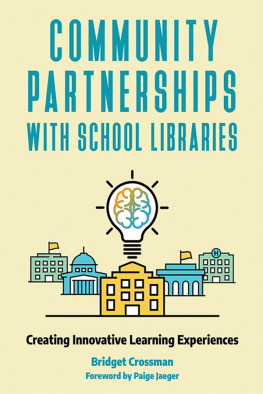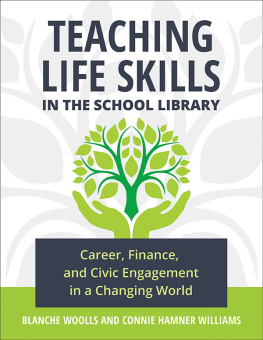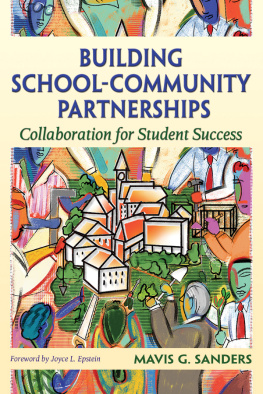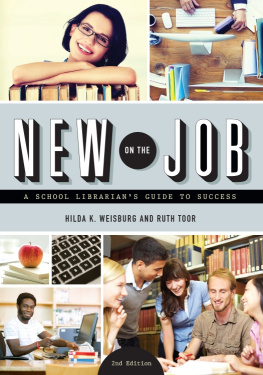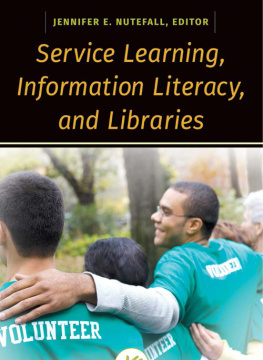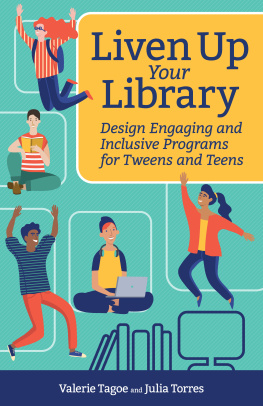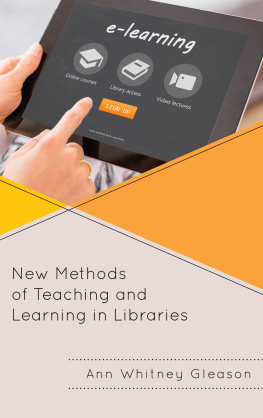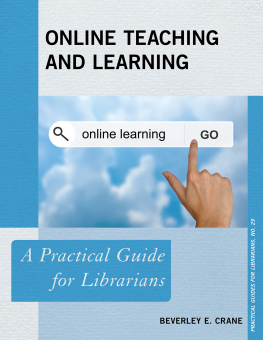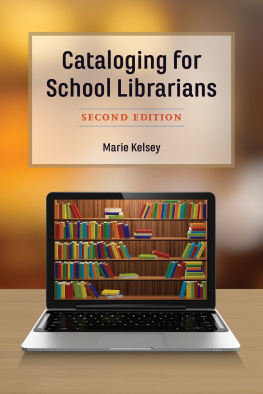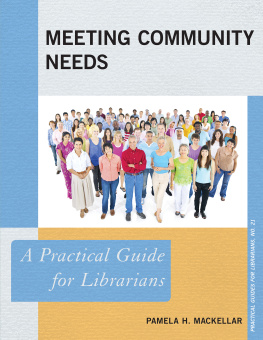Community Partnerships with School Libraries
Community Partnerships with School Libraries
Creating Innovative Learning Experiences
Bridget Crossman
Foreword by Paige Jaeger

Copyright 2019 by Bridget Crossman
All rights reserved. No part of this publication may be reproduced, stored in a retrieval system, or transmitted, in any form or by any means, electronic, mechanical, photocopying, recording, or otherwise, except for the inclusion of brief quotations in a review, without prior permission in writing from the publisher.
Library of Congress Control Number:2019021184
ISBN: 978-1-4408-6891-7 (paperback)
978-1-4408-6892-4 (ebook)
23 22 21 20 191 2 3 4 5
This book is also available as an eBook.
Libraries Unlimited
An Imprint of ABC-CLIO, LLC
ABC-CLIO, LLC
147 Castilian Drive
Santa Barbara, California 93117
www.abc-clio.com
This book is printed on acid-free paper 
Manufactured in the United States of America
Contents
Somewhere between the birth of the Information Age and our current age of misinformation, the primary and prominent role of librarians being a reading advocate was marginalized. At the same time, weve seen a growth in testing, which relies on an ability to read, read well, and read critically. Recently the National Assessment of Educational Progress (NAEP) scores were released, and the International Literacy Association wrote a report, which began as follows:
Concerns that reading scores of U.S. students have remained flat for the past decade have surfaced again along with suggestions about the source of this problem and how it might be remedied.
Librarians all over America have been rallying for reading, but our voice seems to have been muffled by technology and test preparation. Dare we claim that the pendulum needs to swing back and recognize that our elementary students need to return to learning to read and reading to learn? Dare we advocate for increasing the volume of reading as a solution?
Dont get me wrongI am a technology advocate and spent four years programming for an international company prior to getting an MLIS. I know the power and prominence of technology. But I also recognize that reading may be the weakest link https://www.literacyworldwide.org/docs/default-source/where-we-stand/ila-exploring-the-2017-naep-reading-results.pdf 20 March, 2019 in our educational chain right now. Reading well and reading critically will prepare kids for success as well as testing. It will also prepare them for life.
By building a stronger reading program in your school, you will be supporting your buildings educational goals. Dont marginalize your role. Librarians are the keepers of the keys. Now is the time to strive for students to read more, to read deeply and critically, and to experience the joy of finding a great book.
If you are looking for ways to strengthen the reading program within your school or community, then this book is a must-read. If you are looking for ways to connect to your community and collaborate with classrooms, you will find a plethora of ideas to replicate. Bridget carefully explains and details the research and reasons behind her winning ideas. From tapping into community experts to connecting globally via technology, her ideas are easy to replicate and will breath twenty-first-century ideas into your program.
As a successful classroom-teacher-turned-librarian, Bridget has been able to grow her building role into a leadership via a techno-literacy model. Some of her many standards- aligned connection ideas have been detailed in this book, offering a glimpse into purposeful planning. Successful curriculum connections take purposeful planning. If you are wondering how and where to start, get a few ideas here from the American Revolution to pollution in nearby habitats.
It is easy to see why she has won accolades from the NYS Reading Association. Her districts inquiry-based curriculum overhaul was largely spearheaded because of the two librarians (and supportive technology director) in the district. Bridget writes from successful experience.
If we are careful and purposeful to build a community that values literacy, our students will be successfulto say nothing of our programs. Why not learn from someone who has forged this path? Everything from marketing ideas to handouts is shared for your success. Enjoy these ideas, and weave a few into your library world.
Enjoy the journey!
Paige Jaeger
Note
.
Opportunity is here! The generation of learners who fills our libraries, classrooms, and school buildings has the vast ability to impact our world in ways other generations only dreamed about. Technology has changed how, when, and where we learn, connect, and engage, thus creating a flat world. As acknowledged by Thomas Friedman (2007), the flat world allows for a singularly connected field of knowledge that can bring with it an amazing era of innovation (8)an era where individuals need to be prepared to not only compete with people all over the world but also work and collaborate with them (11). Schools must outfit our learners for success in todays globally connected world. Librarians are prepared to be the leaders in arming our schools with innovative learning experiences that equip our students for the future. Its time to unleash our skills, talents, and creativity to make a huge impact on learning and learners.
I am proud of our profession. The work done by Future Ready Librarians with the support of the Alliance for Excellent Education (n.d.). in defining the progressive role of a Future Ready Librarian is cutting edge and both inspirational and aspirational. Couple that with the rollout of the 2017 American Association of School Librarians (AASL) National School Library Standards and we have two powerhouse resources for meeting the needs of twenty-first-century learners. Kudos to the leaders in our profession for recognizing the need to adapt the standards and principles of our work to meet the changing needs and demands being placed on our learners. Now, it is the responsibility of each of us to embrace their work and use it to empower the creation of innovative learning experiences in our libraries and schools.
What are you doing in your libraries to meet the changing demands? In 2008, Dr. Tony Wagner published The Global Achievement Gap: Why Even Our Best Schools Dont Teach the New Survival Skills Our Children Needand What We Can Do about It, where he shared his research that resulted in a list of Seven Survival Skills for the 21st Century Learner. These skills focus on the need for schools to change their systems in order to produce innovative thinkers, communicators, and collaborators. Later, Wagner copublished Most Likely to Succeed: Preparing Our Kids for the Innovation Era, where he again touted the need to develop these skills in schools, emphasizing the fact that since the publication of The Global Achievement Gap: Why Even Our Best Schools Dont Teach the New Survival Skills Our Children Needand What We Can Do about It, he had not received one objection to the need for schools to place value on changing their systems to address these essential skills (Wagner and Dintersmith 2015, 50). If we can agree that these skills are so important that we need to change our systems, then it is clear that we as librarians can start by embracing the new

